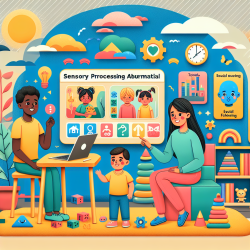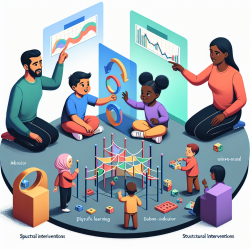Stuttering, characterized by disruptions in the fluency of verbal expression, can significantly impact a child's social interactions and self-esteem. The research article "Impact of cognitive behavioural play therapy on social anxiety among school children with stuttering deficit" highlights a promising intervention for mitigating these challenges. This blog will discuss the key findings and provide actionable insights for practitioners to enhance their therapeutic approaches.
Understanding the Research
The study employed a pretest-posttest randomized control group design involving 178 schoolchildren in inclusive schools in Southeast Nigeria. Participants in the intervention group underwent a cognitive behavioral play therapy (CBPT) program, while those in the control group were assessed at three points without receiving the intervention. The results were analyzed using repeated measures ANOVA, revealing significant reductions in social anxiety scores among children who received CBPT.
Key Findings
- CBPT significantly decreased social anxiety scores in children with stuttering deficits.
- The intervention showed consistent positive impacts across different assessment points.
- CBPT proved to be a long-term psychotherapeutic program with substantial benefits.
Implementing CBPT in Practice
For practitioners looking to incorporate CBPT into their therapy sessions, the following steps are recommended:
1. Building Rapport
Establish trust and confidentiality with the children. This foundational step ensures that they feel safe and supported throughout the therapy process.
2. Identifying and Expressing Feelings
Assist children in recognizing maladaptive beliefs and behaviors in social settings through play. Encourage self-reflection and the identification of illogical ideas and beliefs.
3. Developing Social Skills
Engage children in group discussions and practice exercises to verbalize problem-solving skills. Focus on teaching appropriate social language and adaptive self-statements.
4. Enhancing Self-Esteem
Incorporate activities that build self-esteem and positive self-image. Teach children to replace negative self-defeating behaviors with positive coping self-statements.
5. Managing Anger
Provide training on anger management techniques and emphasize the importance of cooperation and coping with social order.
Encouraging Further Research
While the study provides robust evidence of the efficacy of CBPT, further research is needed to explore its impact on different populations and settings. Practitioners are encouraged to document their observations and outcomes to contribute to the growing body of knowledge on this intervention.
To read the original research paper, please follow this link: Impact of cognitive behavioural play therapy on social anxiety among school children with stuttering deficit.










